CLIMADAPT
CLimate change IMpacts and ADAPTation group

Projects
- MOIRAI- Mutliscal Ocean Models And Information For Climate Risk Assessment and Impact Mitigation
NOV 2024 - APR 2028
Funding: HORIZON EUROPE, E.C.
Description: MOIRAI endeavors to weave a comprehensive understanding of the ocean's dynamics and biogeochemical cycles through advanced models, integrating historical data, current observations, and future projections. MOIRAI is set to advance the next generation of regional to coastal ocean and biogeochemical climate models in european seas, bridging the gaps between operational and regional ocean climate models. Benchmarked with improved climate modelling and prediction capacities in the estuarial-coastal-open sea continuum, the developed models will contribute to the european green deal, addressing resilience to climate change (both mitigation and adaptation) in coastal areas. It aims to create replicable scientific frameworks and pave the way for basin-scale services, fostering collaborative initiatives across European regional seas.
Role of CLIMADAPT: NOA will implement a statistical downscaling methodology (Varotsos et al. 2023) generating climate projections for key ocean and atmospheric variables across various scales in all MOIRA regions. NOA will downscale atmospheric, ocean and biogeochemical variables from multi model and multi scenario CMIP6 CC projections in MOIRAI regions, to be used as inputs to the biogeochemical models . NOA will also contributes to the communication and dissemination activities of the MOIRAI project.
Web site: https://moirai-project.eu
- CLIMADAT-hub- High resolution gridded CLIMAte change DATasets for Greece
FEB 2024 - JAN 2026
Funding: H.F.R.I I (Hellenic Foundation for Research & Innovation) call “Basic research Financing (Horizontal support of all Sciences)” under the National Recovery and Resilience Plan “Greece 2.0” funded by the European Union – NextGenerationEU
Description: CLIMADAT-hub’ bridges the gap between the climatic information available and the information needed for assessing climate risks at the local scale by developing -high resolution observational gridded datasets -statistically downscaled seasonal forecasts -climate change projections that cover the entirety of Greece. https://www.linkedin.com/company/climadat-hub/
Role of CLIMADAPT: is to produce daily observed gridded datasets for Essential Climate Variables based on quality controlled, homogenised data from multiple observational meteorological networks in Greece. In addition, NOA will provide high-resolution probabilistic seasonal forecasts and skill metrics Furthermore CLIMADAT group will develop statistically downscaled high-resolution multi-model and multi-scenario long-term climate change projections for Greece. Finally the produced high resolution gridded datasets for all timescales will be used for the development of a public data repository, as well as an online data visualisation tool tailored to the needs of local actors and stakeholders. NOA leads the CLIMADAT-hub project
Web site: https://www.climadathub.gr/
- CHOICE- Mainstreaming Integrated Assessment Models by embedding behavioural change and actor heterogeneity, and increasing their outreach to citizens, communities and industrial actors
NOV 2023 - OCT 2026
Funding: Horizon 2020
Description: CHOICE aspires to mainstream IAMs, embedding them into the lifestyle choices and decision making process of consumers, producers and actors of the Food, Agriculture and Land Use sectors. This ambition is leveraged by a more realistic representation of behaviour change and actor heterogeneity aspects in IAMs, and supported by an approach that bridges social science and marketing tools, with the aim of accelerating climate action. Using digital enablers, CHOICE will orchestrate large scale engagement and ‘green marketing’ campaigns, that have a wide geographical and societal dispersity. Thus, starting from a bottom-up analysis of individual consumers and actors of the food supply chain, and understanding their behavior and their potential for change, CHOICE will use this information in order to consistently feed into a new generation of IAM models, that will correctly reflect the underlying heterogeneity, accounting for multiple representative consumers and actors.
Role of CLIMADAPT: will utilize climate simulations and reanalysis data to calculate crucial climatic indices associated with the agriculture and health sectors on regional and national scales and will implement statistical downscaling techniques. Moreover, NOA will participate in pilot demonstration actions in Austria, Spain, and Greece and will also coordinate the effort to bridge state-of-the-art science with end-users and stakeholders through liaison with various competent scientific and policy entities.
Web site: https://www.climatechoice.eu/
- LIFE MareNatura - Conservation of priority species of marine megafauna in Greece and Italy
JUL 2023 - JUN 2029
Funding: EU LIFE Programme LIFE22-NAT-EL-LIFE-MareNatura/101113792
Description: The MareNatura LIFE Project aims to provide the means for the mitigation of threats for 9 of the most threatened EU priority species of seabirds, marine turtles and marine mammals at the Ionian, South Adriatic and Aegean seas, hosting the strongholds of target species populations in 44 N2K project sites. The project involves a wide consortium of experienced actors, joining forces for the sustainable and effective conservation of the target species and their marine habitats. Aiming to cover existing knowledge gaps, by using a unique survey effort, using modern technologies and methods for producing sufficient ecological information and appropriate planning tools, to deal with the conservation challenges of target species in the Project Area, create a Mediterranean Offshore Biodiversity hotspots Inventory (MOBI), propose suitable hotspots for inclusion in the Greek N2K network, propose Site Specific Conservation Objectives and Management Guidelines for these new sites, as well as for the 44 project sites, ecologically linked with these hotspots (e.g. breeding sites of the target species)
Role of CLIMADAPT: CLIMADAPT group will provide high-resolution climate projections and climate indicators to the MareNature project, focusing on atmospheric and oceanic variables that directly affect breeding, feeding and migration corridors of target marine megafauna. Specific downscaled projections will be offered for selected biodiversity hotspots . The CLIMADAPT group has long-term experience in successfully coordinating and managing international projects, ensuring the appropriate execution of tasks relating to the relevant project’s data management
Web site: https://www.lifemarenatura.eu/en/
- Land evaluation system for agricultural use under the climate crisis (LandEval)
OCT 2022 - SEP 2024
Funding: Green Fund, Greece
Description: The project will develop a unique web application in a GIS environment, which will provide information on the crop species, the cultivation of which could be sustainable in the different regions of Greece and under different climate scenarios by 2050. The results are expected to be an important decision-making tool for the Authorities and other stakeholders and will contribute to the adaptation of Greek agriculture, ensuring sustainable farming, the protection of producers' income and the country's food security.
Role of CLIMADAPT: use of state-of-the-art Regional Climate Models for the development of climate indicators related to the effects of climate change on Greek agriculture, in order to assess its vulnerability with an emphasis on the cultivation of olives, vines and wheat.
Web site: https://www.landeval.gr/
- Prespa’s Green and Blue LifeLines
APR 2022 - MAR 2025
Funding: Fondation Prince Albert II de Monaco
Description: The project seeks to improve knowledge and understanding of the ecological roles, threats, and values of the rivers and riverine habitats of the Greek part of Prespa. Rehabilitate rivers and riparian areas as spawning grounds for endemic fish as sites for priority habitats. Raise awareness and generate community involvement and interest
Role of CLIMADAPT: development of climate parameters and indicators from state-of-the-art Regional Climate Models, related to the effects of climate change on riverine habitats of the Greek part of lake Prespa.
Web site: https://www.dimfe.org/en/projets/prespa-s-green-and-blue-lifelines-00565
- Innovative technologies and socio-ecological-economic solutions for fire resilient territories in Europe (FIRE-RES)
JAN 2021 - DEC 2025
Funding: Horizon 2020
Description: The project will develop multiple innovation actions and 11 Living Labs to foster the socio-technological transition and implement a holistic and integrated fire management strategy. The Living Labs will be located in different parts of Europe (including the North, Central and Southern Europe) as well as one case study in Southern America, and act as demonstration sites of FIRE-RES innovations. https://www.euromontana.org/en/fire-res-new-mountain-project-on-extreme-wildfires-in-mountains/
Role of CLIMADAPT: provision of seasonal forecasts and long term future projections of fire danger and climatic indicators relevant to extreme wildfires
Web site: https://fire-res.eu
- MediterRE3 - REstoring REsilience of Mediterranean landscapes to REduce GHG emissions from wildfires
JAN 2021 - DEC 2023
Funding: European Climate Initiative (EUKI) 2021, Deutsche Gesellschaft für Internationale Zusammenarbeit (GIZ) GmbH has been commissioned by the German Ministry for the Environment, Nature Conservation and Nuclear Safety (BMU) with the implementation of the European Climate Initiative.
Description: The project wants to achieve the enhancement of the capacities of decision makers, policymakers and practitioners from public and private entities at local and national level involved in landscape planning and management and fire prevention in Greece, France and Montenegro to apply and mainstream the principles of Forest Landscape Restoration (FLR) into policies, regulations and integrated land use plans. This will lead to the reduction of GHG emissions from wildfires through the integrated biomass management and fire-risk reduction of three target landscapes: Prokletije / Komovi Nature Parks (Montenegro), Samaria National Park (Greece) and Luberon NRP (France).
Role of CLIMADAPT: Development and application of a robust science-based methodology for estimating the reduction in fire-related GHG emissions under future climate change scenarios in fire- smart, mosaic-like resilient landscapes
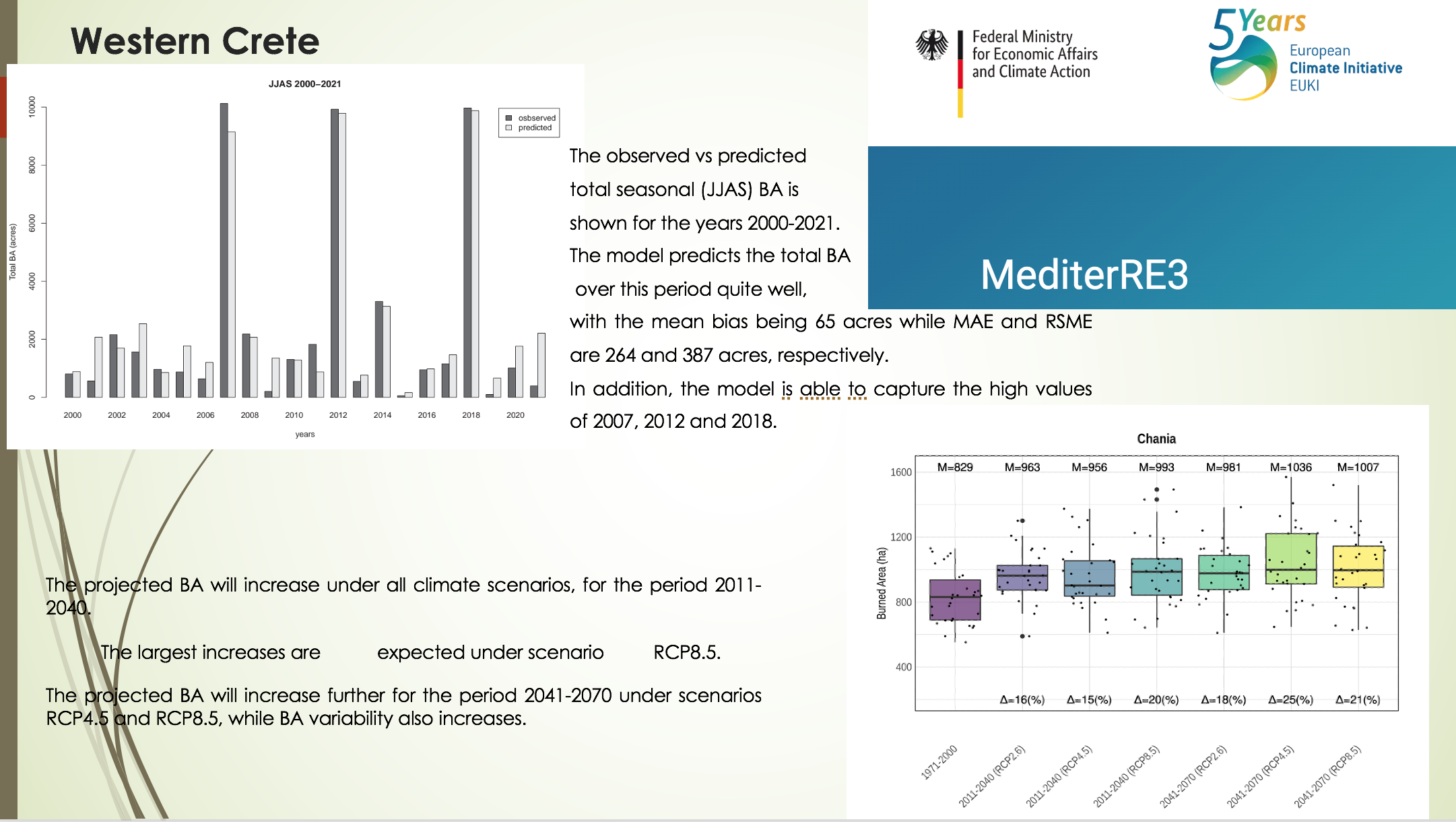
- National Climate Change Network- CLIMPACT
JAN 2020 - OCT 2021
Funding: General Secretariat for Research and Innovation
Description: CLIMPACT aims to: a) integrate, harmonize and optimize the existing climate services and early warning systems for natural disasters related to climate change in Greece, b) create a scientific core of excellence in research, to generate new knowledge on climate change by supporting innovative studies and c) establish an interdisciplinary consortium, which will be the main advisory body for the Greek government and the citizens on issues relevant to climate change and climate change impacts.
Role of CLIMADAPT: Coordination of Action 5.1 which is related to the assessment of climate change impacts on the tourism sector. To this aim a number of indices will be calculated such as simple threshold and absolute indices for temperature and precipitation, indices related to tourism and beach activities such as the Tourism Climate Index and The Beach Climate Index, respectively and indices related to the energy demands for cooling during the summer period and the fire danger. Responsible for constructing an online GIS-based and easily accessible platform to visualize the most up-to-date projections for the future climate in Greece.
Web site: https://climpact.gr/main/
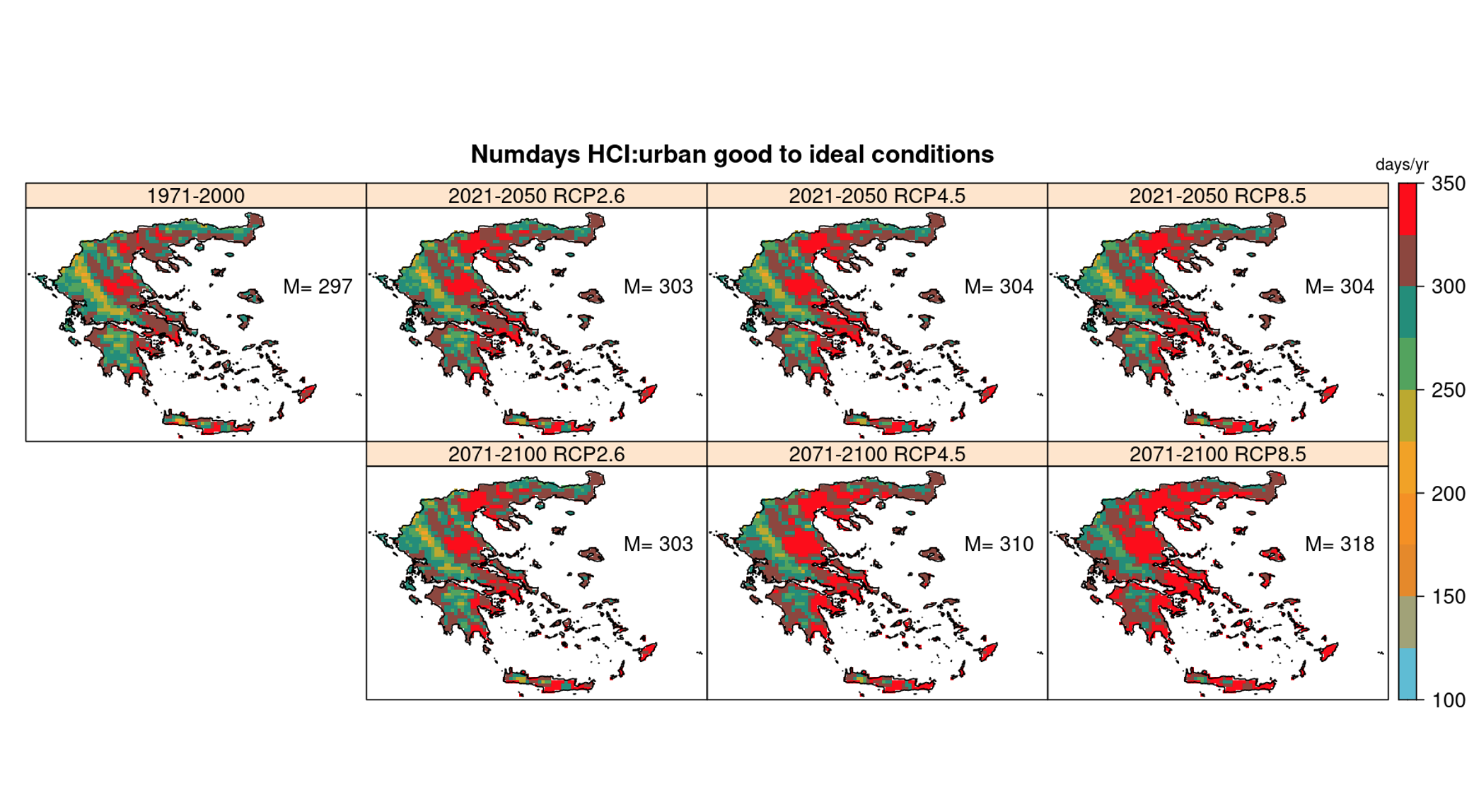
- LIFE-IP AdaptInGR - Boosting the implementation of adaptation policy across Greece
JAN 2019 - DEC 2026
Funding: LIFE17 IPC/GR/000006
Description: The overall goal of the LIFE-IP AdaptInGR project is to support the implementation of the national adaptation strategy in Greece. To this end it will build national and regional capacity for coordinating, prioritising, monitoring and mainstreaming adaptation policy actions. Pilot projects will be developed in priority sectors for 3 regions and 5 municipalities. The project will also identify suitable funding schemes and programmes for the further implementation of the adaptation measures at local, regional and national level. In addition, it will develop and disseminate strategies, guidelines, and best practices to transfer and replicate lessons learnt throughout Greece, at EU level and in the Eastern Mediterranean region. Finally, it will frame the next cycle of adaptation planning through an evidence-based review of the national adaptation strategy and regional adaptation action plans to identify emerging adaptation priorities and measures to feed into the post-2020 ESIF programming period.
Role of CLIMADAPT: Production of climate projections for the entire Greece and the 13 Regions, provision of high resolution (1-3km) climatic information for the 12 pilot areas, as well as the landscape and cultural heritage pilot sites, set up of monitoring indicators for agriculture for the integrated climate change adaptation monitoring and evaluation framework, monitoring the impact of the project pilot actions.
Web site: https://www.adaptivegreece.gr/en-us
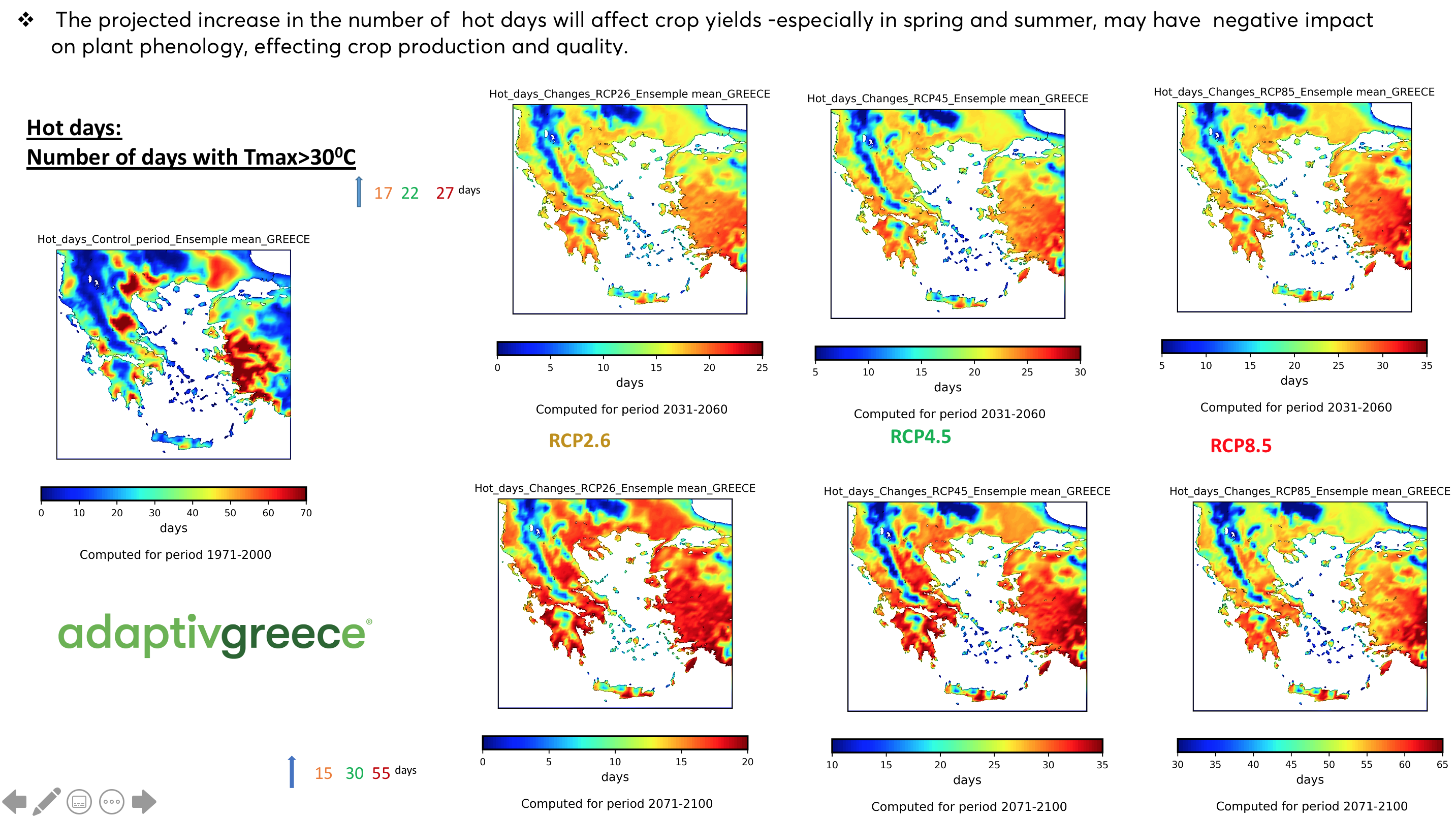
- EXTREMA
JAN 2018 - DEC 2019
Funding: Directorate-General for European Civil Protection and Humanitarian Aid Operations (DG-ECHO) of the European Commission, Grant Agreement ID: 783180.
Description: EXTREMA aims to develop a tool that can spot-out in real time the city areas that suffer most during the ongoing event, indicating thus where the victims are to be expected. EXTREMA uses real-time satellite data, along with other model and city-specific data to estimate the temperature, humidity, and discomfort index for every square kilometer in the city. Temperature estimates are updated every 5 minutes, providing data at a spatial and temporal resolution that is not available from any other service.
Role of CLIMADAPT: Analysis of climate simulations to study the effects of climate change on urban areasGiannis
Web site: https://extrema.space
- MED-GOLD - Turning climate-related information into added value for traditional MEDiterranean Grape, OLive and Durum wheat food systems
DEC 2017 - OCT 2021
Funding: H2020-EU.3.5.1 Fighting and adapting to climate change, Grant agreement ID: 776467
Description: The project aims to use state-of-the-art climate and climate prediction data - on a seasonal and long-term scale - and translate them into easily accessible, valuable information for a wide range of end-users in the agriculture sector. It will eventually provide climate services for grapes, olives and durum wheat through tools that will be developed to build more resilient, efficient and sustainable agriculture and food systems. The tools will share a common platform to maximize accessibility and ease of use for end users, as well as to create synergies that will arise from common issues shared by the three sectors of agriculture. These tools will provide information on risk management associated with the spread of pests, quality and loss of yield as well as other climate-related crop threats.
Role of CLIMADAPT: To assemble historical and climate change information under two different climate scenarios and to calculate certain bioclimatic indicators for Andalusia, Spain, and Douro Valley, Portugal, in order to be incorporated to the tools that are developed in the frame of the project for the optimum management of grape and olive crops. Also, the coordination of the working package WP2 (Co-design of climate service for olive/olive oil).
Web site: https://www.med-gold.eu
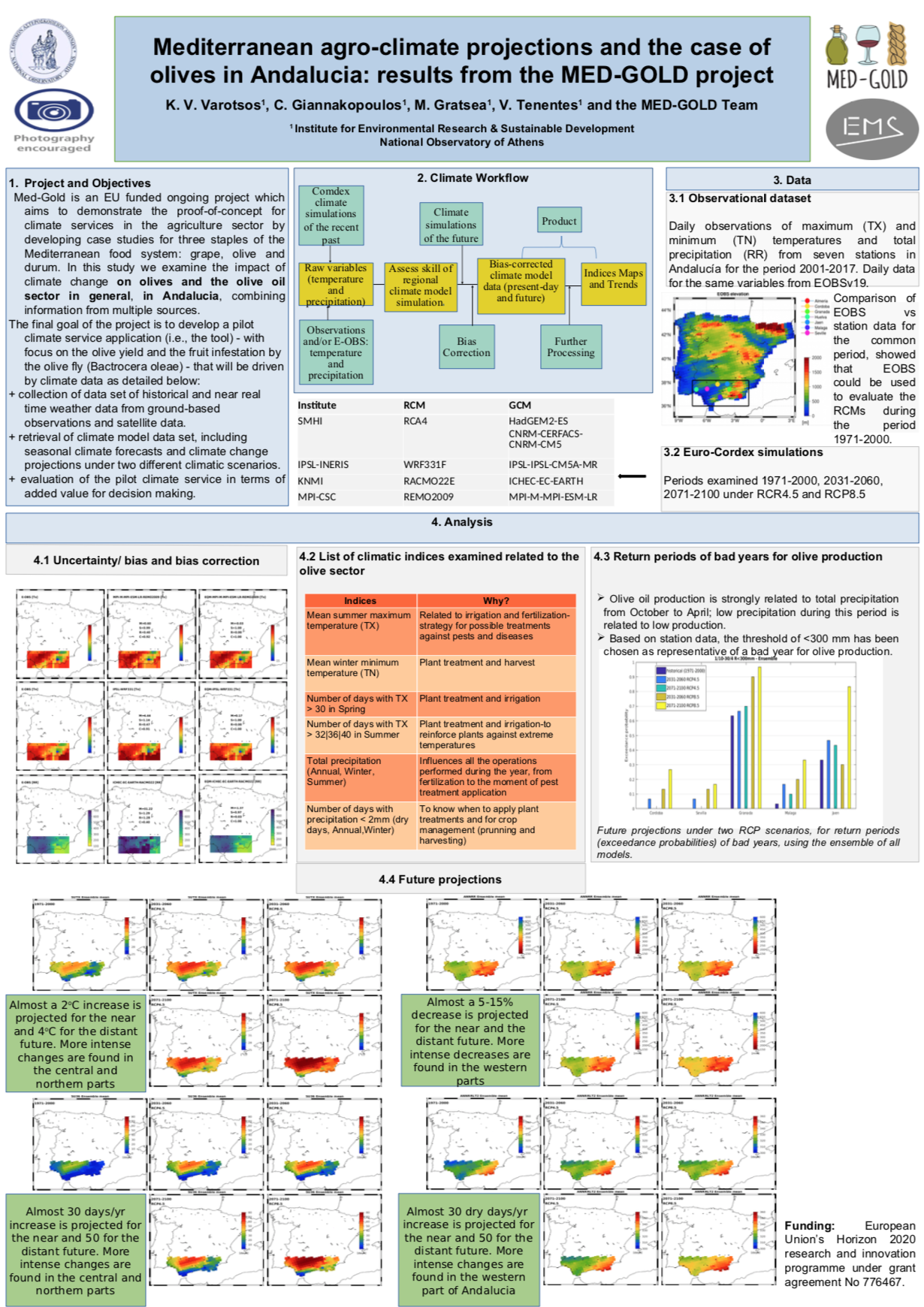
- SOCLIMPACT- DownScaling CLImate ImPACTs and decarbonisation pathways in EU islands, and enhancing socioeconomic and non-market evaluation of Climate Change for Europe, for 2050 and Beyond
DEC 2017 - MAR 2021
Funding: H2020-EU.3.5.1. Fighting and adapting to climate change, Grant agreement ID: 776661
Description: SOCLIMPACT aims at modelling downscaled CC effects and their socioeconomic impacts in European islands for 2030–2100, in the context of the EU Blue Economy sectors, and assess corresponding decarbonisation and adaptation pathways, complementing current available projections for Europe, and nourishing actual economic models with non-market assessment, by: a) Developing a thorough understanding on how CC will impact the EU islands located in different regions of the world. b) Contributing to the improvement of the economic valuation of climate impacts by adopting revealed and stated preference methods. c)Increasing the effectiveness of the economic modelling of climate impact chains, through the implementation of an integrated methodological framework. d) Facilitating climate-related policy decision making for Blue Growth, by ranking and mapping the more appropriate mitigation and adaptation strategies. e) Delivering accurate information to policy makers, practitioners and other relevant stakeholders.
Role of CLIMADAPT: modelling climate change impacts in EU islands and climate-related risk information to policy makers and the general public, operationalization of forest fires impact chain
Web site: https://soclimpact.net
- Copernicus Climate Change Service (C3S): European Tourism
OCT 2017 - JUN 2019
Funding: Copernicus C3S. Ref No: ecmwf/copernicus/2017/c3s_422_lot2_tec.
Description: Copernicus Climate Change Service (C3S) European Tourism is a service that aims to provide a user-driven climate information system to the tourism sector. By delivering critical pan-European climate indicators relevant to tourism (e.g. snow conditions, holiday climate index, lake water temperature, forest fires index), the service aims to facilitate ongoing and long-term adaptation of the tourism sector to a changing climate. Τhe service will offer interactive web applications, based upon high-level quality data and tools from the Copernicus Climate Data Store (CDS). The applications will cover different timescales including: past climate (reanalysis data), short-term (seasonal forecast products) and long-term (regional climate projections). The service is oriented towards a highly diverse set of users, including intermediaries (such as consultancy companies or environment agencies), businesses (such as tour operators or investors in tourist infrastructure and services), destination managers, tourist associations and policy makers.
Role of CLIMADAPT: The provision of seasonal forecast and long term future projections of fire danger indicators for Europe
Web site: https://climate.copernicus.eu/european-tourism
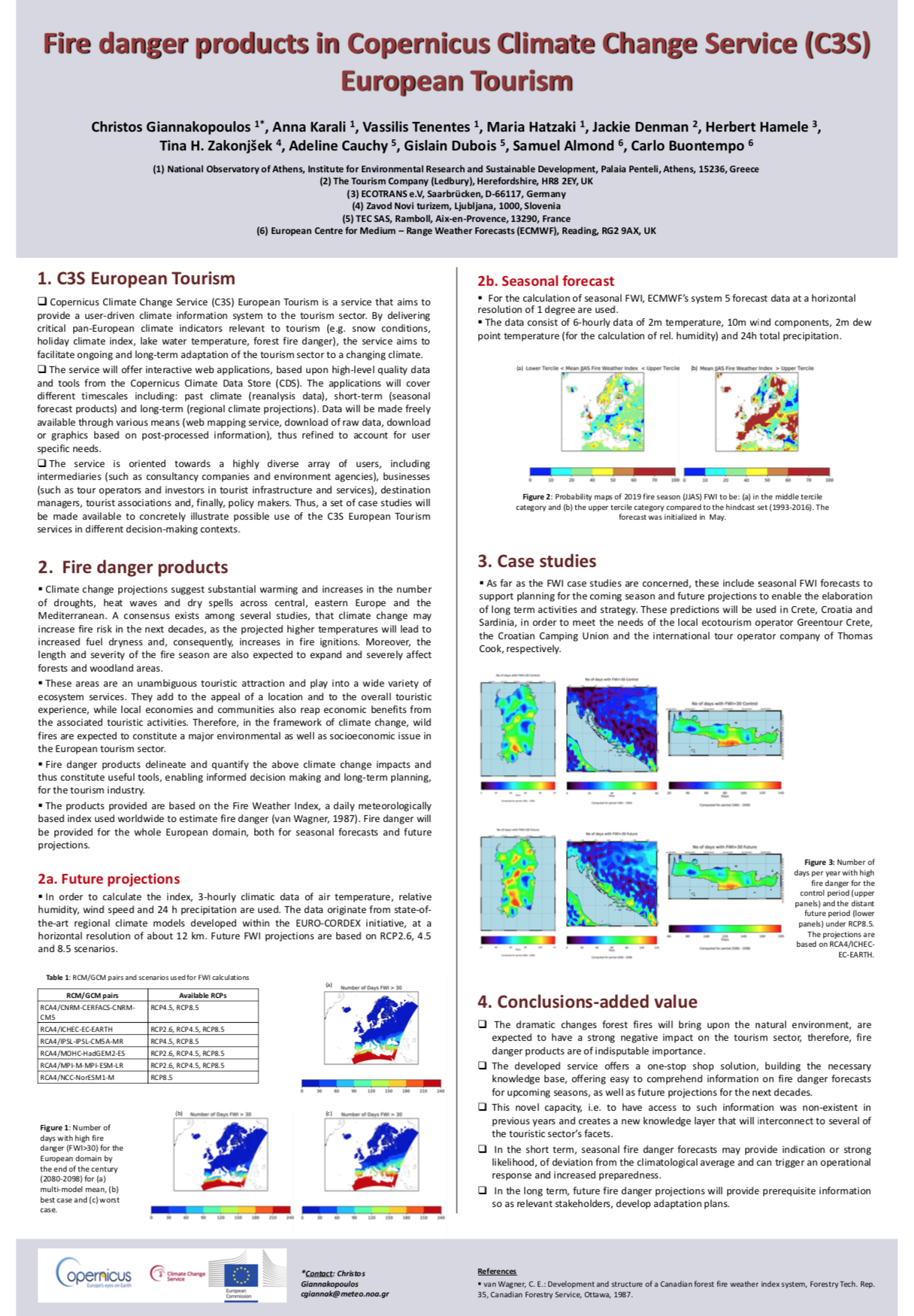
- DISARM- Drought and fIre obServatory and eArly waRning systeM
SEP 2017 - SEP 2019
Funding: Transnational Cooperation Programme Interreg Balkan‐Mediterranean
Description: The key purpose of DISARM project can be summarized in developing, validating and demonstrating a set of services that employs state-of-the-art observational and modeling techniques with the aim to assist interested authorities in better preventing, addressing and finally mitigating the adverse impacts of droughts and wildland fires, with the latter being intensified due to climate change. In this context, the overall objective is to deliver an innovative, integrated observation and early warning system that will serve as a key tool for protecting the environment and, consequently, promoting sustainable development in the vulnerable region of southeast Mediterranean.
Role of CLIMADAPT: contribution to the online service with the development of a climatic component, providing assessments of fire danger and drought conditions.
Web site: http://disarmfire.eu
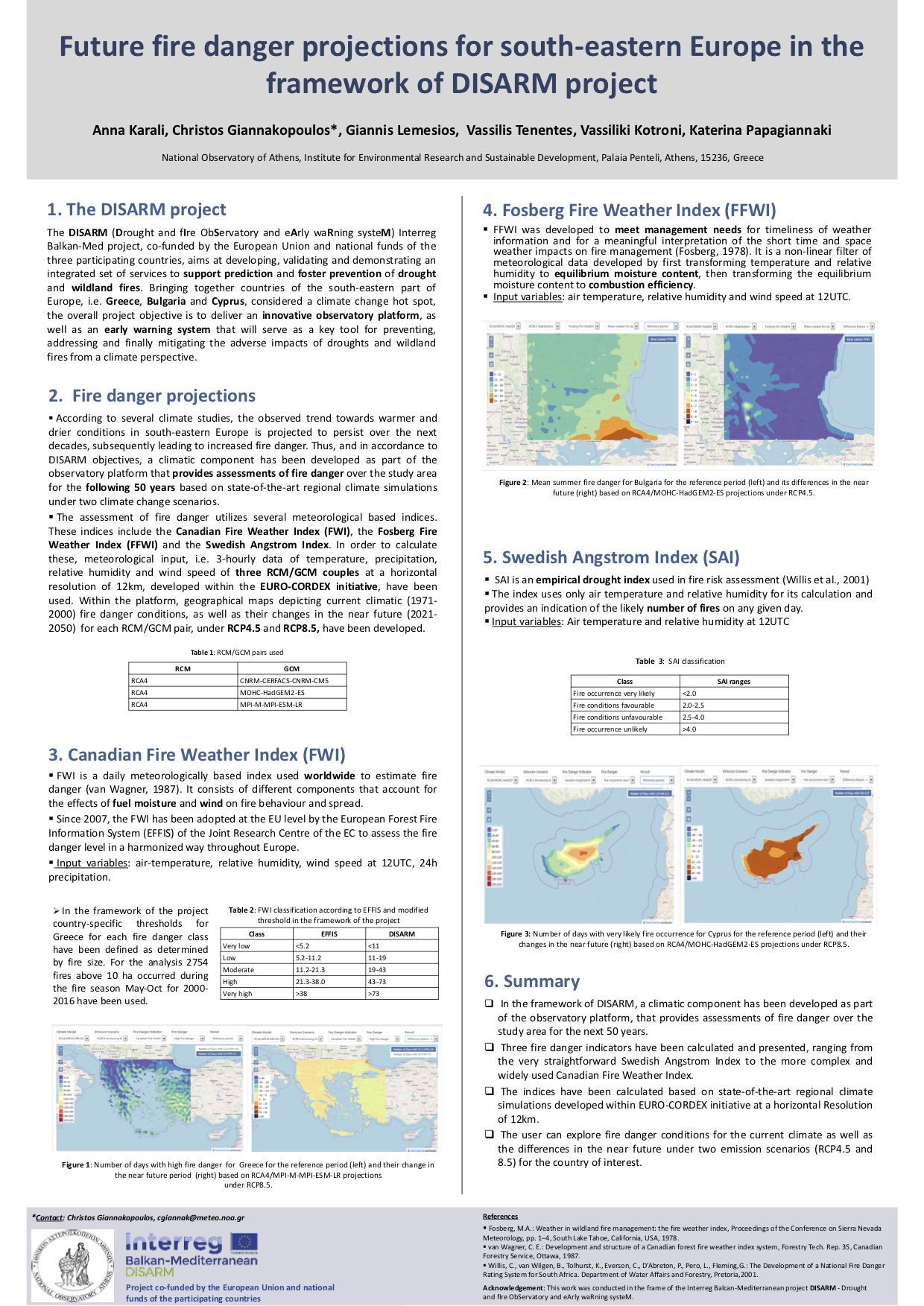
- TERRACESCAPE- Employing Land Stewardship to transform terraced landscapes into green infrastructures to better adapt to climate change
JUL 2017 - AUG 2021
Funding: LIFE programme for the Environment and Climate Action (2014-2020), LIFE Ref No: LIFE16 CCA/GR/000050
Description: The aim of the project is the restoration and re-cultivation of a prominent element of the Mediterranean landscape, the drystone terraces, aka “pezoules” throughout Greece, and “aimasies” in Andros. The main objective is the demonstration of the benefits (economic, cultural, ecological) deriving from such a prospect and its on-site multiplier application. The ultimate goal is the creation of adapted “green infrastructures” as an offset to the impacts of climate change. The project will take place in Andros Island with the aim of expanding to other Aegean and Mediterranean islands.
Role of CLIMADAPT: The study of the microclimate in selected locations before and after the project interventions through the installation of 13 meteorological stations on the island of Andros. Analysis of the current climatic situation in Andros and in the wider Aegean area, emphasizing in extreme events. Assess future climate change in Andros and Aegean islands using state-of -the-art regional climate models.
Web site: http://www.lifeterracescape.aegean.gr
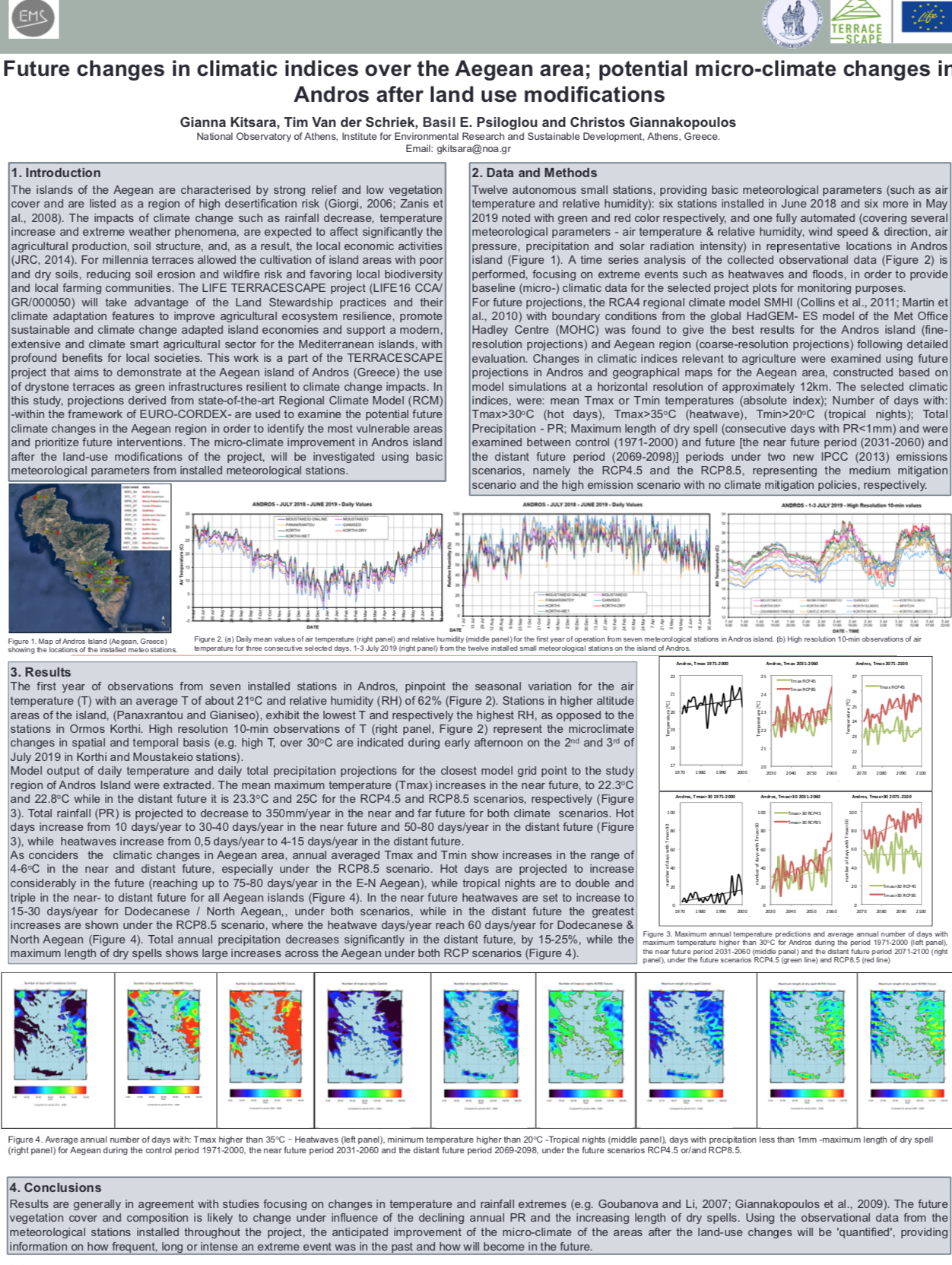
- TRIBUTE - Trigger Buffer Zones for Inundation Events
JAN 2017 - DEC 2018
Funding: Directorate-General for European Civil Protection and Humanitarian Aid Operations (DG-ECHO) of the European Commission. Ref No: ECHO/SUB/2016/742480/PREV08.
Description: Tribute aims to a) provide services to Civil Protection authorities by a software tool that will ensure timely evacuation decisions, b) assess meteorological hazards from satellites and generate a European ‘reference dataset’ for meteorological hazards that will provide consistent information for the whole Europe and c) examine climate trends, changes in climate parameters and precipitation regime and identify regions that are likely to undergo large amounts of rainfall changes.
Role of CLIMADAPT: climate change impact assessment on the extreme precipitation in five European countries; Greece, Bulgaria, Netherlands, Italy and Spain
Web site: http://tribute.eu-project-sites.com/
- UrbanProof- Climate Proofing Urban Municipalities
OCT 2016 - APR 2021
Funding: LIFE programme for the Environment and Climate Action (2014-2020), LIFE Ref. No: LIFE15 CCA/CY/000086
Description: The overall aim of the UrbanProof project is to increase the resilience of municipalities to climate change by equipping them with a tool that supports their climate change adaptation planning. This tool will: a) Provide insight into the expected changes in climate, b) Enhance understanding of climate change impacts and the mechanisms defining vulnerability, c) Enable the exploration and evaluation of available adaptation options and d) Provide guidance for monitoring the adaptation process.
Role of CLIMADAPT: Simulation of current climate and projections of future changes in climate, heat related vulnerability assessment, mapping of the Urban Heat Island (UHI) effect in the Municipality of Peristeri-Athens, decision support tool development
Web site: https://urbanproof.eu
- PRESPA WATERBIRDS- Bird conservation in Lesser Prespa: benefiting local communities and building a climate change resilient ecosystem"
OCT 2016 - SEP 2021
Funding: LIFE programme for the Environment and Climate Action (2014-2020), LIFE Ref No: LIFE15 NAT/GR/000936
Description: The overall project aim of the LIFE Prespa Waterbirds is to improve the conservation status of target bird species in the area. The project's conservation actions will also help the ecosystem adapt to climate change, while providing benefits to the local community. In addition, the project will also contribute to the implementation of EU nature and biodiversity policy and legislation by applying Natura 2000 network site management and wetland restoration actions, as well as public awareness and training. In addition, the project will contribute to achieve "good status” of Prespa Lake under the Water Framework Directive and will contribute to the EU Climate Change Adaptation Strategy
Role of CLIMADAPT: Assessment of habitat vulnerability to climate- and lake level change to establish “climate change proof” wetland vegetation management; developing and hosting of sessions for the summer schools for wetland management and monitoring techniques.
Web site: https://www.prespawaterbirds.gr
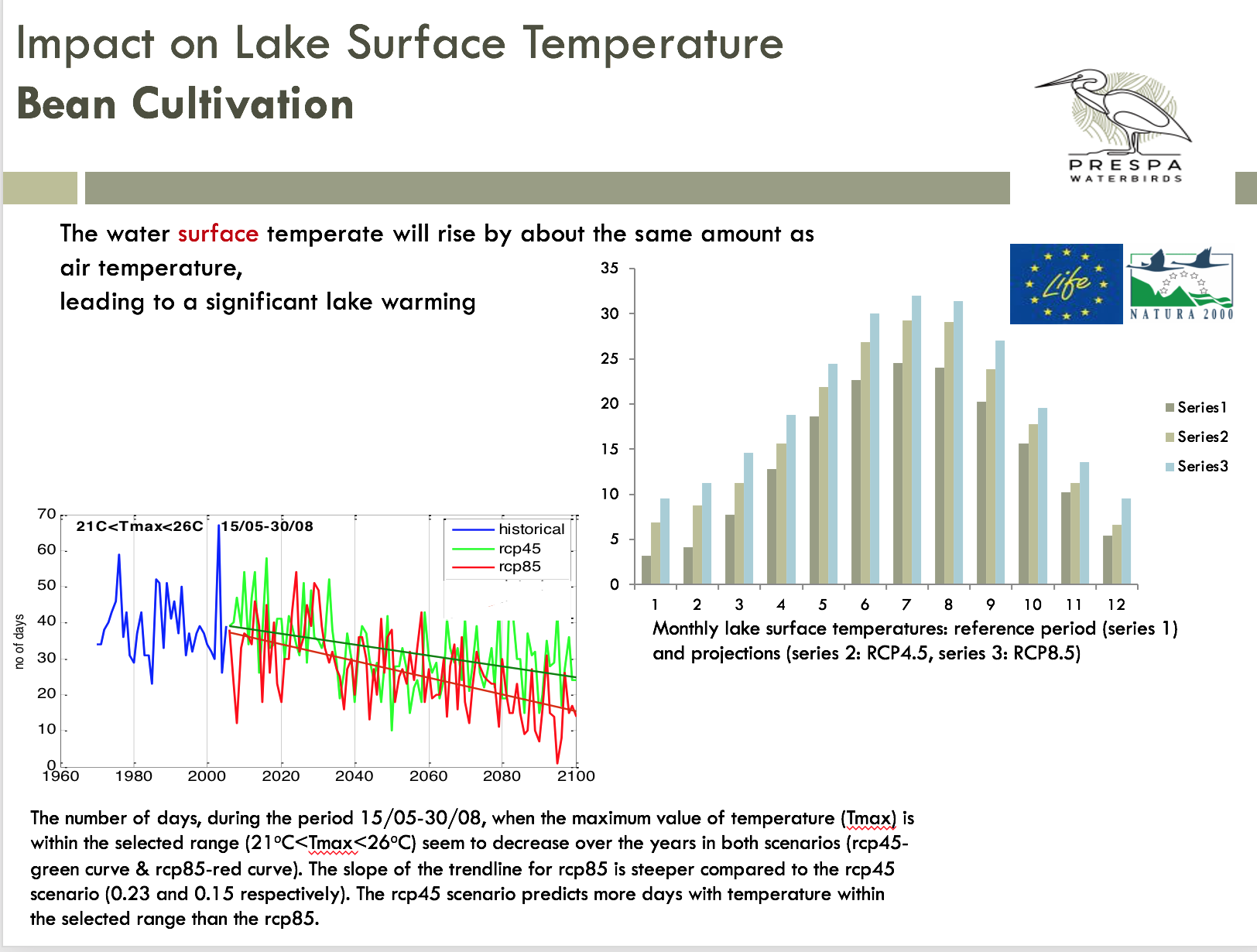
- ADAPT2CLIMA- Adaptation to Climate change Impacts on the Mediterranean islands' Agriculture
OCT 2015 - FEB 2020
Funding: LIFE programme for the Environment and Climate Action (2014-2020), LIFE Ref. No: LIFE14 CCA/GR/000928
Description: LIFE ADAPT2CLIMA aims to increase knowledge on the vulnerability of EU Mediterranean agriculture to climate change and to support decision making for adaptation planning. The project methodology is based on the deployment of a set of climate, hydrological and crop simulation models for the assessment of climate change impacts on agriculture, as well as, on the development of a decision support tool (DSS) for the elaboration of adaptation strategies for the agricultural sectors of the three islands. It enhances stakeholder involvement and participation in adaptation planning, promotes early action for addressing the potential damages and minimizing threats posed by climate change on agriculture, creates opportunity for proper coordination of national and regional policies and authorities for facing climate change impacts and works towards increasing EU's effectiveness in addressing regional and global challenges related to climate change and agriculture.
Role of CLIMADAPT: project coordinator, climate change projections of indicators relevant to agriculture, decision support tool development, dissemination activities
Web site: http://adapt2clima.eu
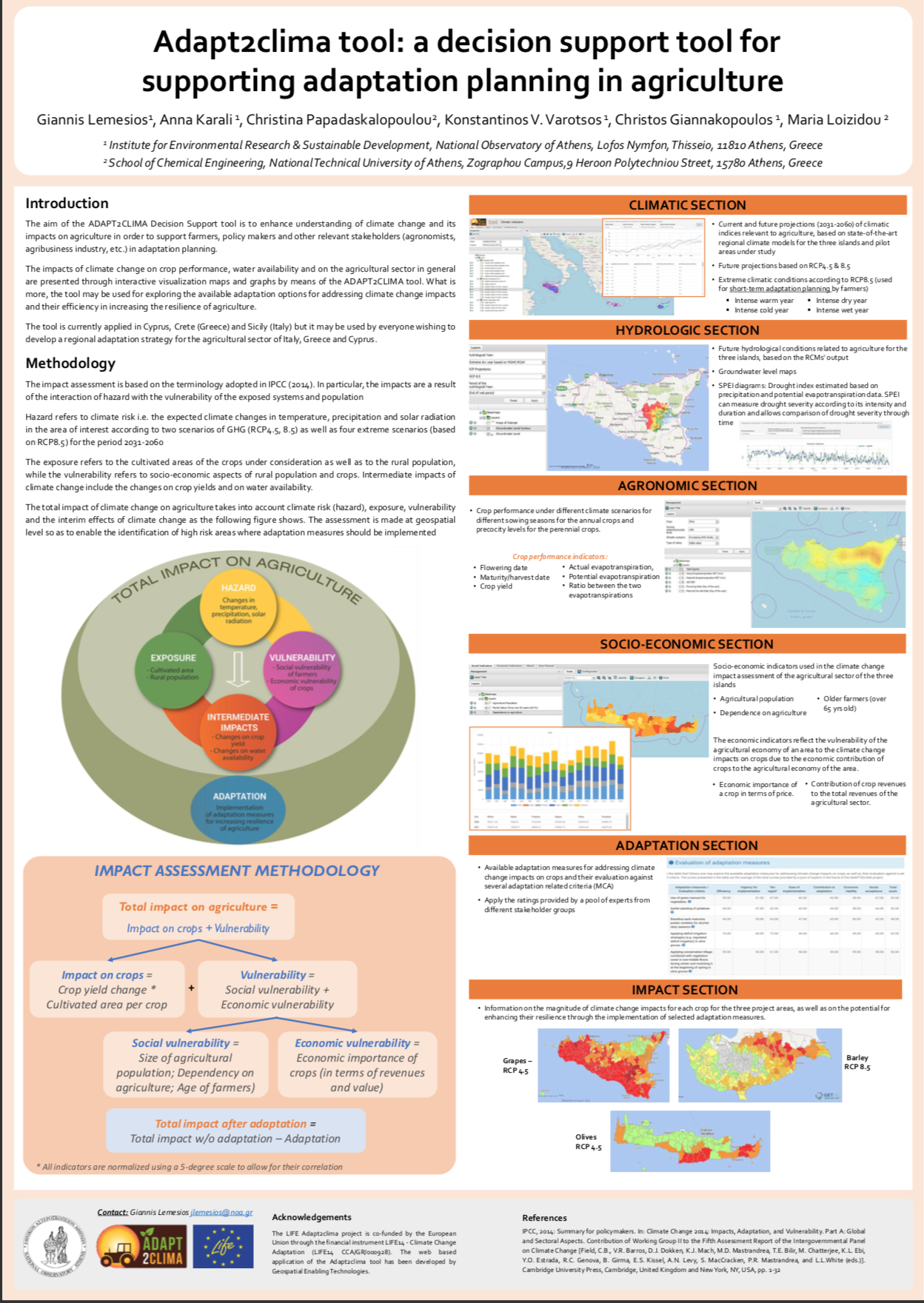
- Treasure- Thermal Risk Reduction Actions and Tools for secure cities
JAN 2015 - DEC 2016
Funding: Directorate-General for European Civil Protection and Humanitarian Aid Operations (DG-ECHO) of the European Commission, Grant Agreement No. 695561
Description: TREASURE integrates -for the first time-the expertise of epidemiologists, climatologists, Earth Observation scientists and IT developers into intelligent heatwave risk assessments for Authorities and personalized tools for citizens. The project objectives are: a) to assess the past, present and future heat wave hazard by means of satellite measurements, long time series of meteorological station data as well as the best available climate models, b) to quantify urban heatwave health risk via epidemiological studies, c) to provide services to Authorities to reinforce urban resilience to heat waves and d) To provide personalised heat wave risk estimations to citizens.
Role of CLIMADAPT: development of an interactive web-map based tool for the estimation of future climate change indices of relevance to heat, population discomfort and energy demand (http://treasure.climpacts.gr/).
Web site: http://treasure.eu-project-sites.com
- Xenios- Climate change impacts on the tourism development of sensitive areas of Greece. Pilot area: Messinia- Areas of integrated tourism development.
JAN 2012 - DEC 2013
Funding: NSRF Research Funding Programme COOPERATION 2009, Project ID: 09ΣΥΝ-31-067
Role of CLIMADAPT: analysis of climatic data, statistical downscaling and future climate change projections including fire danger and energy demand assessments.
- CLIM-RUN- Climate Local Information in the Mediterranean region Responding to end User Needs
MAR 2011 - FEB 2014
Funding: FP7-ENVIRONMENT - Specific Programme "Cooperation": Environment (including Climate Change), Grant agreement ID: 265192
Description: CLIM-RUN aims at developing a protocol for applying new methodologies and improved modelling and downscaling tools for the provision of adequate climate information at regional to local scale that is relevant to and usable by different sectors of society (policymakers, industry, cities, etc.). The protocol is assessed by application to relevant case studies involving interdependent sectors, primarily tourism and energy, and natural hazards (wildfires) for representative target areas (mountainous regions, coastal areas, islands). CLIM-RUN is thus intended to provide the seed for the formation of a Mediterranean basin-side climate service network which would eventually converge into a pan-European network.
Role of CLIMADAPT: statistical downscaling, analysis of climatic data and future fire danger assessment for the Mediterranean, development of a web mapping application of fire danger and fire related indices for Greece in collaboration with WWF Greece (http://www.oikoskopio.gr/map/index.php?lng=en-US).
Web site: http://www.climrun.eu
- CIRCE- Climate Change & Impact Research: The Mediterranean Environment
APR 2007 - JUN 2011
Funding: FP6-SUSTDEV - Sustainable Development, Global Change and Ecosystems: thematic priority 6 under the Focusing and Integrating Community Research programme 2002-2006, Grant agreement ID: 36961
Description: CIRCE aims at developing for the first time an assessment of the climate change impacts in the Mediterranean area. The objectives of the project are: a) To predict and to quantify physical impacts of climate change in the Mediterranean area, b) To evaluate the consequences of climate change for the society and the economy of the populations located in the Mediterranean area, c) To develop an integrated approach to understand combined effects of climate change, d) To identify adaptation and mitigation strategies in collaboration with regional stakeholders CIRCE wants to understand and to explain how climate will change in the Mediterranean area.
- DeSurvey - A Surveillance System for Assessing and Monitoring Desertification
MAR 2005 - OCT 2010
Funding: FP6-SUSTDEV - Sustainable Development, Global Change and Ecosystems: thematic priority 6 under the Focusing and Integrating Community Research programme 2002-2006., Grant agreement ID: 3950
Description: In spite of the relevance of diagnosis to help the success of desertification treatment, there is a lack of standardized procedures to perform it at operational scales. DeSurvey offers a contribution to fill this gap by complementing assessment of desertification status with early warning of risks and vulnerability evaluation of the involved land use systems. To this purpose the interactive effects of climatic and human drivers of desertification will be taken into account in a dynamic way. The project goal is to deliver a compact set of integrated procedures, with application and tutorial examples at the EU and national scales.
- ENSEMBLES- ENSEMBLE-based Predictions of Climate Changes and their Impacts
SEP 2004 - DEC 2009
Funding: FP6-SUSTDEV - Sustainable Development, Global Change and Ecosystems: thematic priority 6 under the Focusing and Integrating Community Research programme 2002-2006, Grant agreement ID: 505539
Description: Aim of the project is the development of an ensemble forecast system for use across a range of timescales (seasonal, decadal, and longer) and spatial scales (global, regional, and local). This model system will be used to construct integrated scenarios of future climate change, including both non-intervention and stabilisation scenarios. This will provide a basis for quantitative risk assessment of climate change and climate variability, with emphasis on changes in extremes, including changes in storminess and precipitation, and the severity and frequency of drought, and the effects of "surprises'', such as the shutdown of the thermohaline circulation. Most importantly, the model system will be extensively validated. Hind casts made by the model system for the 20th century will be compared against quality-controlled, high-resolution gridded datasets for Europe. Probability forecasts made with the model system on the seasonal and decadal timescales will also be validated against existing data. The exploitation of the results will be maximised by linking the outputs of the ensemble prediction system to a wide range of applications. In turn, feedbackfeedbacks from these impact areas back to the climate system will also be addressed. Thus ENSEMBLES will have a structuring effect on European research by bringing together an unprecedented spectrum of world-leading expertise.
- MICE- Modelling the impact of climate extremes
JAN 2002 - DEC 2004
Funding: FP5-EESD - Programme for research, technological development and demonstration on "Energy, environment and sustainable development, 1998-2002", Grant agreement ID: EVK2-CT-2001-00118
Description: MICE aims to study changes in extreme event occurrence resulting from anthropogenic climate change, as predicted for Europe by global and regional climate models; and to evaluate the impacts of the predicted changes on selected categories of the human environment and activities. Spatial and temporal patterns of extreme event occurrence will be analysed for precipitation (flood, drought and snow lying), temperature (heat stress) and windstorm. MICE will estimate likely future changes in extremes and define the uncertainties. The impacts of interest are forestry, agriculture, energy use, tourism, and property and life insurance. Interpretation of the results for use by stakeholders and policy-makers is central to the project.
© 2025 CLIMADAPT Group